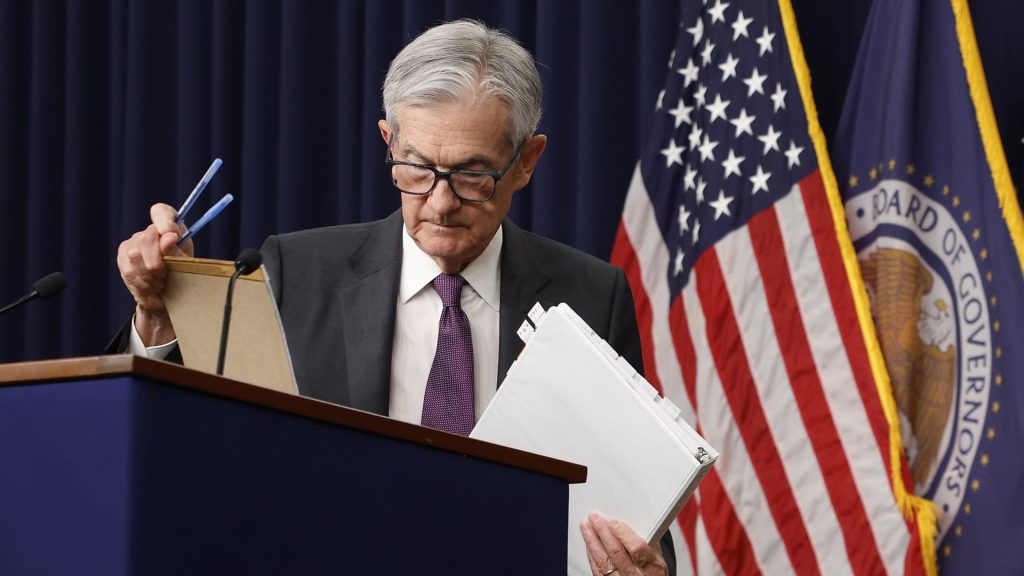In a recent speech by Federal Reserve Chair Jerome Powell, concerns were raised regarding a potential conflict between controlling inflation and fostering economic growth. The remarks came amidst rising uncertainty linked to President Donald Trump’s tariffs and their expected impacts on the economy. Powell emphasized that while inflation might rise and growth could slow, the exact priorities of the Federal Reserve remain unclear.
| Article Subheadings |
|---|
| 1) Dual Mandates: Inflation vs. Economic Growth |
| 2) The Role of Tariffs in Economic Predictions |
| 3) Current Economic Indicators and Future Outlook |
| 4) Market Reactions to Powell’s Speech |
| 5) Summary of Key Economic Data Points |
Dual Mandates: Inflation vs. Economic Growth
The Federal Reserve has a dual mandate to maintain stable prices and achieve full employment. In his speech, Jerome Powell articulated the potential tension between these two critical goals, particularly in light of the significant economic shifts posed by incoming tariffs. He acknowledged that policymakers may face a dilemma in addressing rising inflation while also needing to support economic growth, especially as inflationary pressures mount. This realization points to the necessity for flexibility in the Fed’s approach as the economic landscape evolves.
The Role of Tariffs in Economic Predictions
Tariffs imposed by the Trump administration are expected to create upward pressure on inflation by making imported goods more expensive. This development effectively acts as a tax on consumers, which in turn could lead to increased costs of living and dampened consumer spending. Powell remarked that the impact of these tariffs is uncertain, as they might not only trigger a temporary rise in inflation but could also have more lasting effects depending on their scale and the duration of their economic implications. The challenge for the Federal Reserve is to monitor these changes closely and adjust monetary policy accordingly in response to evolving economic conditions.
Current Economic Indicators and Future Outlook
As the Federal Reserve prepares to release economic forecasts, the first quarter’s economic data will be under scrutiny. Powell referenced expectations for minimal growth in GDP during this period. A mix of strong retail sales and consumer behavior influenced by anticipated tariffs offers a nuanced view of the economy. The Commerce Department reported an unexpected 1.4% increase in retail sales in March, partially attributed to consumers making purchases ahead of potential tariff implementations. Despite this, Powell noted that overall consumer spending appears to be growing modestly, indicating a slowdown compared to previous quarters.
Market Reactions to Powell’s Speech
Investors reacted swiftly to Powell’s remarks. As his speech unfolded, stocks witnessed a decline, and Treasury yields shifted downward, reflecting market concerns regarding the dual challenges of rising inflation and sluggish growth. Powell’s statements emphasizing the Fed’s wait-and-see attitude before making any policy adjustments resonated with traders, who are keenly aware of the complexities surrounding interest rate decisions going forward. While Powell refrained from specifying future interest rate trajectories, market expectations suggest a likelihood of rate cuts beginning mid-2025.
Summary of Key Economic Data Points
Looking at the broader economic context, Powell’s commentary highlighted the importance of monitoring inflation expectations. Despite the immediate hurdles posed by tariffs, the Fed’s long-term goal remains anchored around 2% inflation. Current indicators have suggested a slight uptick, with expectations showing an anticipated inflation measure of 2.6% for March. The data reviewed by the Fed points to a mixed economic picture; while consumer spending experienced a positive trend, other factors like heightened import activity are expected to impact GDP growth negatively.
| No. | Key Points |
|---|---|
| 1 | Powell signaled a potential dilemma between managing inflation and supporting economic growth. |
| 2 | Tariffs are expected to create inflationary pressure, complicating the Fed’s monetary policy decisions. |
| 3 | Retail sales have recently improved, influenced by consumer behavior ahead of tariff announcements. |
| 4 | Market sentiment shifted negatively in response to Powell’s remarks on inflation and growth concerns. |
| 5 | The Fed remains focused on keeping inflation expectations anchored at around 2%. |
Summary
The remarks made by Jerome Powell illustrate the delicate balance the Federal Reserve must strike between curbing inflation and supporting economic growth in a landscape characterized by uncertainty and external pressures from tariffs. As both inflationary and growth-related challenges persist, the Fed’s approach to monetary policy will be crucial in maintaining stability in the economy. The macroeconomic factors in play necessitate ongoing monitoring and a flexible stance to ensure that the central bank can react appropriately to evolving conditions.
Frequently Asked Questions
Question: What are the Fed’s dual mandates?
The Federal Reserve is tasked with promoting stable prices and maximum sustainable employment, known as its dual mandates.
Question: How do tariffs affect inflation?
Tariffs can increase the cost of imported goods, which may lead to a rise in overall consumer prices, contributing to inflationary pressures.
Question: What is the expected GDP growth for Q1?
Current estimates suggest that the GDP growth for the first quarter could show little to no growth compared to previous periods, with factors such as increased imports due to anticipated tariffs weighing down the forecast.
